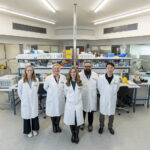The NDDC benefits from the latest in advanced robotic ultra-high throughput screening, addressing a critical early challenge in the drug discovery pipeline. Its quality, capabilities and scale are comparable to global pharmaceutical industry standards, with the flexibility and innovation of academia.
The NDDC is embedded within world-class biology research at WEHI, positioning it to deliver first-in-class, innovative drug discovery projects. The NDDC is active from target discovery to preclinical candidate stage.
The NDDC has a large portfolio of projects, both completed and ongoing, that includes:
- proprietary WEHI projects
- academic collaborations with other research institutions and universities
- collaborative projects with industry partners (biotech and pharma) in the context of strategic alliances or simple fee-for-service models; and
- projects subsidised by the Australian Government, specifically supporting Australian scientists from academic institutions and small and medium enterprises (SMEs)
Business models are flexible and adapted to the needs of each project and partner. Interested parties should contact Leigh Coultas, Business Development Manager, for an evaluation of how the NDDC could help.








